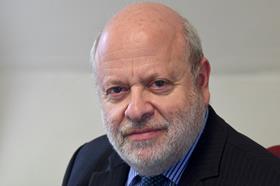At the end of last week, an important meeting took place at the Council of Europe. Some people think that, by definition, no meeting of the Council of Europe can be important. But for our profession, it was significant.

The meeting was the first of its Committee of Experts on the Protection of Lawyers, called CJ-AV. Its job is to draft a legal instrument to strengthen the protection of the lawyers’ profession in Council of Europe member states, including ‘the right to practise the profession without prejudice or restraint’. Its final product may turn out to be binding, and, if so, will be the first convention anywhere covering the legal profession with such effect.
There was a time when our own profession in England and Wales might have condescended towards an activity like this. We would have seen it as the kind of thing which was necessary for troubled countries in central and eastern Europe, but not for lawyers in the oldest democracy in the world.
But English solicitors have been going through a torrid time. In just the last few days, the attacks on our profession have continued unabated, to the point where we are suffering one of our gravest reputational crises:
- ‘Lawyers, accountants and other professionals who facilitate the oligarchs’ crimes must be prosecuted’;
- 'Our pinstriped classes should be disgraced for their role as enablers, allowing some of the worst people in the world to launder reputations and riches through our financial and legal system. The libel lawyers who have so vindictively and ruthlessly tried to silence brave investigative journalists and campaigners should hang their heads in disgrace. Those besuited traitors should be donating to Ukrainian humanitarian and military fundraisers every penny made from serving the Russian elite’s 30-year looting spree;
- ‘Tomorrow I will be testifying at the US Helsinki Commission about the problem of Western law firms, PR firms and investigation agencies working effectively as arms of the Russian security services in the US and Western Europe. It’s a huge problem that no one talks about’.
This article will not repeat our defences to these charges. But the CJ-AV committee of the Council of Europe is a place where lawyers’ protections can be debated and agreed, and then put into a - hopefully binding - convention. (Along with that, there needs to be a debate in our own jurisdiction about lawyers’ ethics in the light of the challenges, with difficult questions asked around the meaning of some of the SRA Principles, such as integrity and independence – but that is also a different matter.)
Our profession is lucky, because it has a representative on CJ-AV. The Council of Europe now has 45 member countries - it had 46, but Russia unsurprisingly is out. There are only 15 country representatives on CJ-AV, and one of them is from the UK. Even better, although a number of the country representatives are civil servants, ours is a practising solicitor: Tony Fisher from Fisher Jones Greenwood LLP.
The agenda of the opening meeting has been published. It gives nothing away, but there is one important document which was circulated with the papers, which is a list of background documents. If you ever need to consult international standards and other reports listing the rights of lawyers, and guidelines to the rule of law, you will find them gathered in this document.
Forgive me if I refer to one of the background documents. It was written by me as a consultant to the Council of Europe. It looks at the position in relation to procedural safeguards and protection against undue interference for lawyers in five countries: Armenia, Belarus, Georgia, Republic of Moldova and Ukraine. As the project went on, two of the countries suffered devastating fates: Belarus and Ukraine. Their lawyers are victims.
Belarus is not a member of the Council of Europe, and was already experiencing the extensive reach of the state into the regulation of its lawyers.
Ukraine continues to be a Council of Europe member. As would happen regardless of which country in the world was being studied, including our own, the report lists a number of troubling legal issues - principally the impunity with which state officials disregarded lawyers’ basic rights. However, Ukrainian stakeholders, from the government, parliament and the legal profession, were engaged with the Council of Europe to try and improve matters.
In all of the five countries covered by the report, lawyers believed that a Council of Europe convention on lawyers’ rights would be a useful step forward to protect lawyers as they go about their work.
And now for us also, in our present reputational travails, I believe that such a document would be very helpful.
Jonathan Goldsmith is Law Society Council member for EU & international and a former secretary general of the Council of Bars and Law Societies of Europe. All views expressed are personal and are not made in his capacity as a Law Society Council member, nor on behalf of the Law Society































2 Readers' comments